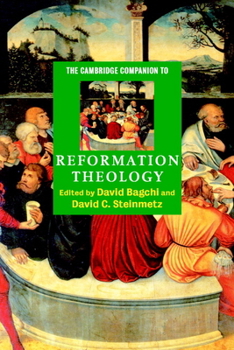The Cambridge Companion to Reformation Theology
(Part of the Cambridge Companions to Religion Series)
Select Format
Select Condition 
Book Overview
Each chapter in this Companion includes an up-to-date account and analysis of the thought associated with a major Reformation theology figure or movement. The book also focuses on lesser reformers such as Martin Bucer, and on the Catholic and Radical Reformations, as well as the major Protestant reformers.
Format:Paperback
Language:English
ISBN:0521776627
ISBN13:9780521776622
Release Date:December 2004
Publisher:Cambridge University Press
Length:300 Pages
Weight:1.12 lbs.
Dimensions:0.7" x 5.9" x 8.9"
Customer Reviews
1 rating
A Good Overall Overview of the Reformation
Published by Thriftbooks.com User , 19 years ago
Although the Reformation is often thought of in terms of Luther and Calvin, it was much broader than that. There were many reformers in many European lands at the time, and this book discusses quite a few of them. However, a major shortcoming of this book is its failure to do more than briefly mention Jan Laski, a Polish Reformer. Although this book focuses on the Reformation, it also discusses the Roman Catholic response to the Reformation, and not only in terms of the Council of Trent. Even though Luther's initial conflict with the Catholic Church is often framed in terms of the manner of salvation of a Christian, this book argues that the actual conflict was primarily in terms of church authority. Otherwise, the Catholic-Protestant conflict is often seen in terms of the former promoting the authority of Tradition, and the latter promoting the authority of Scripture. But it was not as simple as that. There were some Catholic counter-reformers who sought to refute Protestant claims solely from Scripture. Conversely, some Protestant polemicists argued that the teachings of the post-apostolic Christian church (e. g., the Church fathers) actually reinforced and supported Protestant theological views. Soon, Protestants and Catholics each claimed to own the teachings of the primitive Christian church, and to accuse its opponents of heretical innovation. Each sided often misrepresented the others' teachings. For example, Luther's teaching of "faith alone" for salvation was misrepresented as teaching that a Christian can live any way he wants. In actuality, Luther stressed good works, but as an outcome, not condition, for salvation. Conversely, the Catholic Mass was misrepresented as re-crucifying Christ every time it was offered. In fact, it did and does no such thing.






